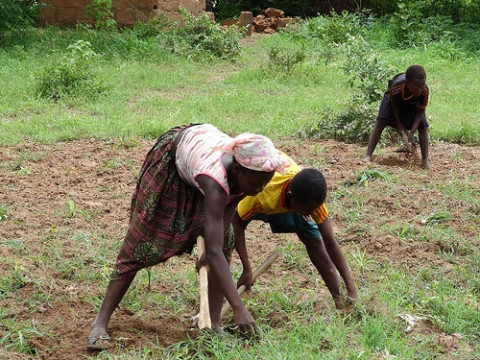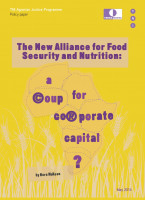Nutrition and food – how government for and of the people became government for and by the TNCs
Temas
Advocating multistakeholderism in the area of food and nutrition has been one of the main strategies for advancing a pro-corporate agricultural agenda that results in dispossession of small-scale farmers.

One of the most advanced pilots of corporate-led multistakeholderism, promoted by the World Economic Forum (WEF, is in the area of food and nutrition with the WEF's establishment of the Global Food, Agriculture and Nutrition Redesign Initiative (GFANRI) in 2010.
According to the GRI report “the goal of the GFANRI is to guide the development of food and agriculture policy and supportive multi-stakeholder institutional arrangements that will address current and future food and nutrition requirements within the realm of environmentally sustainable development”.
With a declared focus on “children under two years of age and school children” the strategy outlines a set of recommendations to “strengthen small farmers’ productivity, the quality of their products, their access to markets and value chains, and income growth for poverty reduction”, with a strong emphasis on involvement of the private corporate sector, public—private partnerships, and multi-stakeholder initiatives.
Since 2010, GFANRI has integrated several initiatives including the Global Alliance for Improved Nutrition (GAIN), the African Green Revolution Association (AGRA), the G7 New Alliance for Food Security and Nutrition for Africa, the UN Secretary-General’s High-Level Task Force on the Global Food Security Crisis (HLTF) and its parallel G8 public-private partnership (PPP) initiative, the Global Partnership for Agriculture and Food Security and the Scale Up Nutrition (SUN) initiative.
These multi-stakeholder bodies advocate policies based on a belief that the liberalisation of international trade can guarantee global and national food and nutrition security (FNS) with no need for specific global or national governance. They pointedly ignore the impact of structural adjustment, the totally unfair international trade conditions imposed by the USA and the European Union (EU), and the role of neoliberal policies in undermining food security.
These pro-corporate initiatives emerged in the wake of the global food crisis in 2007/2008, but long before this, the richest countries consistently sought to undermine the key multilateral spaces dedicated to food and nutrition. In particular, they fought to:
- restrict the political mandate of the Food and Agriculture Organization of the United Nations (FAO) to providing agricultural technical assistance;
- dismantle the Committee on World Food Security (CFS); and
- close the UN Standing Committee on Nutrition (SCN), the UN harmonizing body of global nutrition.
The overall drive has been to progressively transfer governance of “conflicted policy areas” from intergovernmental to multi-stakeholder spaces, strongly influenced, if not led by the agenda and interests of the private corporate sector. This drive excludes those who do not agree, and bypasses legitimately existing one country one vote intergovernmental food and nutrition policy spaces, such as the CFS, the World Health Organization (WHO) and the FAO.
The emergence of a strengthened CFS, with strong civil society participation in the aftermath of the food crisis posed a challenge to this vision and corporate-led process. But the determination to shift to a multi-stakeholder governance forum continues apace, with the theme of nutrition seen as the best entry point for progress.
The SUN initiative is perhaps the most developed of the GRI-promoted stakeholder governance for food and nutrition, with 123 businesses as members. It emerged from a World Bank idea, itself based on several initiatives by the Bill & Melinda Gates Foundation, and intensely promoted by staff of the office of the UN Secretary-General. It has become a powerful institution after the World Bank, UNICEF and rich country governments effectively undermined and then withdrew from the UN Standing Committee on Nutrition.
In November 2014, it was leaked that some UN agency heads were seeking to close down SCN without consulting UN members in anticipation of the launch of a SUN Network Secretariat to be hosted by the World Food Programme (WFP). Throughout 2015, close allies of SUN sought to increase its visibility and role in the FAO Committee on Food Security. Declarations by the G7 in 2015 in support of the SUN agenda, an increasingly cozy relationship between the CFS secretariat and the Gates Foundation, and the announcement by UN Secretary General that he would nominate a new coordinator of the SUN Movement, who would also hold a UN Assistant Secretary General post, shows how far this agenda has already advanced. This occurred at the same time as private corporations sought (unsuccessfully) to increase their representation in the advisory group to the CFS bureau from one to four members.
The corporate capture of nutrition threatens the achievement of food sovereignty and the full emancipation of women. It brings with it industrialised food supplements, nutrient pills and powders, and other means of food fortification that do not serve public health goals. It instrumentalises women’s role as mothers and providers of food to their families.
Meanwhile, the efforts of the food sovereignty movement to treat food and nutrition as inseparable, and to link food, health and nutrition with the health of the planet have no place in SUN or other corporate-captured agendas.
This form of corporate capture, therefore, represents a ‘life grab’. The peoples of the world must call on states to reject corporate capture and reaffirm people’s sovereignty and human rights as a fundamental step to addressing all forms of inequity, oppression and discrimination, and to democratise national and global societies.


